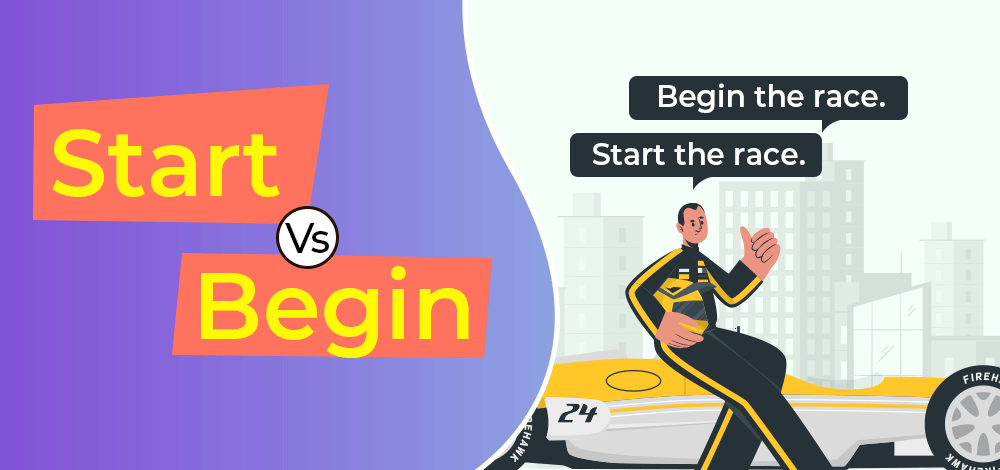Difference Between Start and Begin
Last Updated :
02 Aug, 2023
“Start” and “Begin” are two similar words that are often used interchangeably. However, they have subtle differences in their meanings and uses. While both words refer to the beginning of something, their connotations, and contexts can vary depending on the situation.

Difference Between Start and Begin
Meaning of Start
The verb “Start” refers to the initiation or commencement of an action or process. It implies taking the first step toward a goal or objective. “Start” is typically related to quicker and more impulsive acts. It may also refer to beginning something or creating something.
Usage of Start
Both formal and informal contexts can utilize “start.” It can be used to describe the beginning of a new activity, undertaking, or adventure. It may also be used to describe the introduction of a brand-new occasion, item, or service. In daily English, the word “initiate” is frequently used to express various behaviors and circumstances.
Examples of Start
- The concert will start in five minutes.
- Let’s start the meeting with a brief introduction.
- She started her own business last year.
- The engine made a loud noise when it started.
Meaning of Begin
The verb “Begin” refers to the start or commencement of an action or process. It suggests a deliberate and intentional action towards a specific goal or objective. “Begin” is often associated with actions that are more planned and thought out.
Usage of Begin
“Begin” is a more formal and literary word than “Start” and is often used in formal contexts. It can describe the start of a new project, relationship, or venture. It can also refer to the initiation of a conversation or the beginning of a new phase of life. “Begin” is commonly used in written or spoken language and can convey a sense of purpose or intentionality.
Examples of Begin
- The lecture will begin promptly at 9 am.
- She began her journey toward self-discovery last year.
- Let’s begin the negotiation with an opening offer.
- The movie begins with a dramatic scene setting the story’s tone.
Difference Between Start and Begin
| Start |
Begin |
| To initiate or set in motion. |
To start something. |
| Action-oriented. |
More formal and literary. |
| Describes the beginning of an event, activity, or task. |
Represents the start of something new. |
| Used in a variety of contexts, both formal and informal. |
Also used in a variety of contexts, both formal and informal. |
| Implies the first step in a process or journey. |
Implies a more deliberate and intentional action. |
Conclusion
In conclusion, both “Start” and “Begin” are verbs that refer to the beginning of something. However, they are not interchangeable, as they have slightly different meanings and connotations. “Start” is a more action-oriented word that implies the first step in a process or journey, while “Begin” is a more formal and literary word that implies a more deliberate and intentional action. Both words are used in a variety of contexts, both formal and informal, and understanding their differences can help you use them correctly in your writing and speaking.
Share your thoughts in the comments
Please Login to comment...